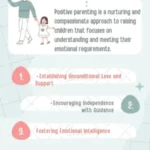Emotional intelligence, often denoted as EQ, embodies the ability to comprehend and master emotions proficiently. Emotional Intelligence in Children helps to navigate the challenges that life presents, forge positive connections, and achieve academic and personal triumphs. Within this article, we shall explore the import of emotional intelligence in the development of children, its pervasive influence on various facets of existence, and delve into positive parenting methodologies that empower parents to raise emotionally intelligent offspring.

Read also: Smart Way to Build Your Child’s Self Esteem
Comprehending Emotional Intelligence in Children
Emotional intelligence encompasses multifarious facets, encompassing self-awareness, self-regulation, empathy, and social adeptness. It surpasses mere academic accomplishments and cognitive prowess, sculpting children into emotionally adept and resilient beings. Progeny possessing heightened emotional intelligence can accurately identify and express their emotions, regulate their emotional reactions, and empathize with the sentiments of others.
The Impact of Emotional Intelligence in Children
Social Relationships:
Progeny with elevated emotional intelligence are better equipped to cultivate positive and wholesome relationships with peers and adults. They possess the acumen to grasp the emotions of others, fostering empathy and effective communication.
Conflict Resolution:
Emotional intelligence empowers children to handle conflicts and disputes constructively. They can manage their emotions and comprehend divergent perspectives, leading to more effective problem-solving and conflict resolution.
Academic Performance:
Emotionally intelligent children are better equipped to cope with the rigors of academic life. They can manage the pressures of exams, setbacks, and challenges with resilience, leading to an enhanced academic performance.
Self-Confidence:
Emotionally intelligent children possess a formidable sense of self-confidence and self-worth. They are more assured in their abilities, empowering them to confront novel challenges with sanguinity and determination.
Emotional Regulation:
Progeny with heightened emotional intelligence can effectively regulate their emotions, circumventing emotional outbursts and impulsive behavior. This self-mastery fosters a more harmonious and well-balanced emotional state.
Positive Parenting Approaches to Cultivate Emotional Intelligence
Emotional Expression and Validation:
Encourage your progeny to openly express their emotions without judgment. Create a secure space where they feel at ease sharing their feelings, whether positive or adverse. Validate their emotions, assisting them in comprehending that a gamut of emotions is acceptable.
Emotional Literacy:
Educate your children to recognize and label their emotions accurately. Employ an emotional vocabulary to aid them in articulating their sentiments. This augments their emotional awareness and comprehension.
Empathy and Perspective-Taking:
Nurture empathy in your progeny by encouraging them to contemplate the feelings and perspectives of others. Engage them in discussions involving diverse viewpoints, aiding them in comprehending the emotions of others and fostering a compassionate outlook.
Model Emotional Intelligence:
Be a positive exemplar by demonstrating emotional intelligence in your own interactions and responses. Demonstrate to your offspring how to manage emotions, resolve conflicts, and communicate effectively.
Emotional Regulation Strategies:
Teach your children diverse techniques for emotional regulation, such as deep breathing, mindfulness exercises, or taking a break when overwhelmed. These strategies empower them to manage their emotions constructively.
Encourage Social Interaction:
Support your children in participating in social activities and forming meaningful connections. These interactions provide opportunities for emotional growth and the development of social skills.
Teach Problem-Solving Skills:
Guide your progeny in honing their problem-solving abilities. Encourage them to brainstorm solutions when faced with challenges, aiding them in navigating emotional situations effectively.
Positive Reinforcement:
Acknowledge and praise your children ‘s endeavors in developing emotional intelligence. Positive reinforcement fortifies their progress and stimulates continued growth.
Cultivate Emotional Resilience:
Assist your children in coping with setbacks and disappointments in a constructive manner. Help them comprehend that failure is a natural facet of life and an avenue for growth.
Conclusion
Emotional intelligence is an indispensable facet of children’s development, molding their ability to navigate life’s complexities with finesse and resilience. As parents, we wield the power to cultivate emotional intelligence in our progeny through positive parenting approaches. By nurturing a supportive environment, imparting emotional literacy, fostering empathy, and exemplifying emotional intelligence, we bestow upon our children the ability to build meaningful relationships, attain academic success, and confront life’s challenges with emotional maturity.
Emotionally intelligent children possess the acumen to comprehend and manage their emotions proficiently, positioning them for a gratifying and successful future. Let us embrace this positive parenting approach and invest in the emotional growth of our progeny, so they may flourish as emotionally adept individuals, equipped to make a positive impact on the world around them.





